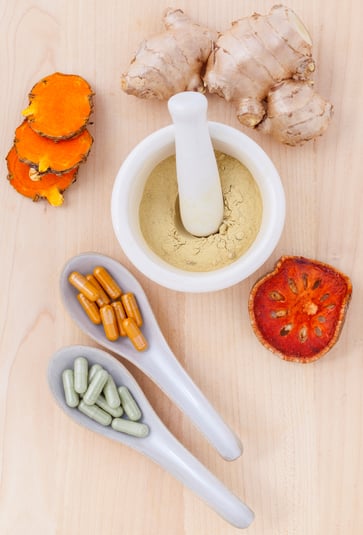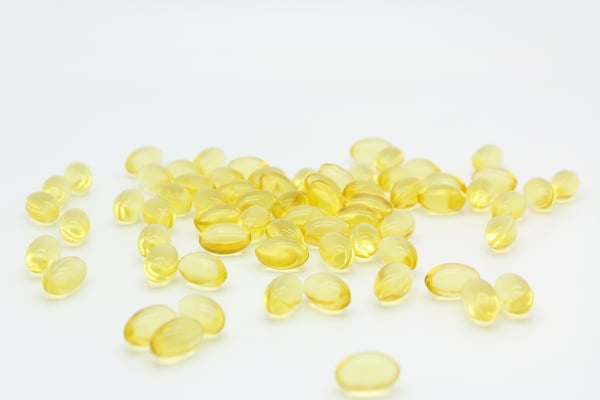
COPD is a relatively common and well-researched condition, which means there are lots of different medications and treatments to help people who suffer from the disease. These include a variety of "natural" treatments for COPD patients that can alleviate both physical and psychological symptoms.
Natural COPD treatments are non-pharmacological treatments that you can take control of yourself. They are opportunities to make changes to your personal habits, health routines, and nutrition to more effectively treat your COPD symptoms at home.
In this post, we're going to introduce you to a number of natural treatments that you can use to improve your COPD. We'll show you how supplements, lifestyle changes, and other natural solutions can help you better manage your symptoms and improve your quality of life.
By helping you take a more well-rounded approach to your health, natural treatments can boost your physical health, mental health, and help you avoid serious health complications from COPD. Using natural treatments can also help you feel more in control of your health and your overall well-being.
The treatments we discuss in this guide are generally safe, accessible, and effective, as long as they are used in combination with standard treatments for COPD. Continue reading to learn more about a variety of natural COPD treatments and what they can do for you.
What is a “Natural” Treatment?

It's important to understand that “natural” is a word that means many different things to different people. It doesn't have any definite scientific or legal definition, which is why it's important to specify what we mean when we refer to a treatment as “natural”.
In this guide, we use “natural” to refer to treatments that don't rely on medical equipment or standard pharmaceutical medications. Instead, the natural treatments we will discuss are the kinds that don't require a prescription or significant supervision from a doctor.
These natural treatments, which include things like nutritional supplements, mind-body exercises, and healthy lifestyle changes, are still recommended by doctors and supported by many in the medical community. This is key, because you should never try to treat your disease with unknown or unsupported treatments.
It's also vital to understand that these natural treatments are not alternatives to taking your prescription medication and should never be used as a replacement for proper medical care. Unfortunately, there is no real replacement or “alternative” to medical COPD treatments, and you should never use any natural treatments that interfere with your primary COPD treatment plan in any way.
The “standard” treatment for COPD, which includes medication, lifestyle changes, and other medical treatments, has been carefully crafted and tested by medical experts. It is still the best known way to manage COPD, and the only known way to slow down the progression of the disease.
However, there are still a variety of natural techniques that you can use to improve your COPD symptoms and your quality of life. Doctors often recommend these natural options, in addition to standard treatments, as a means for their patients to better manage and cope with their disease.
Many people with COPD also appreciate natural treatments because they give them a stronger sense of ownership and involvement in their health. They allow you to take certain aspects of your treatment into your own hands, giving you a better sense of control over your disease.
Natural treatments also help you stay focused on important non-physical aspects of your life, such as your mental and emotional health. In this way, it can expand the scope of your treatment and ensure that you cover all your bases when it comes to your physical and mental well-being.
Natural Treatments for COPD

Now that you understand what a natural treatment is, let's take a closer look at what these treatments actually are. In the next sections, we'll introduce you to a wide selection of the most effective natural treatments you can use to improve your COPD.
Nutritional Supplements

A large number of people with COPD struggle to maintain proper nutrition. Often, this is a result of poor appetite, poor diet, or severe COPD symptoms that make it difficult to eat.
This is exacerbated by the fact that many COPD patients need extra calories to fuel their breathing muscles, which have to work overtime to help them breathe. This need for a high-calorie diet makes it much easier for people with COPD to become malnourished.
Another nutritional problem results from the fact that COPD tends to affect people later in life, when living a healthy lifestyle is often a struggle. At the same time that their bodies are especially vulnerable to nutritional deficiencies, many older adults struggle to get enough nutrients from their diet.
That's why many people with COPD take nutritional supplements to keep their brain, lungs, and the rest of their body strong. These supplements not only prevent nutritional deficiencies and help you manage your COPD symptoms, but some may also help stave off serious diseases and other health complications.
The nutritional supplements we discuss in this section could be beneficial to many COPD patients, but will not be useful to everyone. And remember, you always need to talk to your doctor before making any changes to your diet or nutrition.
When possible, it is best to get your nutrients from a well-balanced diet instead of a supplement. However, taking nutritional supplements is a helpful and often necessary way to ensure you get all the nutrients you need every day.
What's more, studies show that some supplements can even help patients who don't have nutritional deficiencies improve their COPD. What works for you will depend on your individual physiology, your symptoms, and what your doctor recommends.
Calcium
Because many patients suffer from bone density loss, calcium is important for people with COPD. Calcium is the primary nutrient responsible for keeping your bones healthy and strong, and getting too little causes bone loss and osteoporosis.
Getting enough calcium is particularly important for people with COPD, who are more prone to osteoporosis. This is because certain COPD medications, older age, and systemic inflammation caused by COPD all impair your body's ability to repair your bones.
Once you start to lose bone density, you become more prone to accidents, skeletal disfigurement, and loss of physical mobility. Even just one bad fall or injury could result in a break that significantly affects your ability to manage your COPD.
That's why experts recommend that COPD patients take extra steps to prevent calcium deficiency, which often includes taking calcium supplements. You should also make an effort to get plenty of calcium from food sources like dairy, vegetables, and fortified grains.
Getting lots of calcium through diet and supplements is a great natural treatment that helps COPD patients keep their bones and bodies strong. It may even prolong your life by protecting you against debilitating injuries and major losses in physical mobility.
Vitamin D

Vitamin D is another vital nutrient that your body needs to prevent serious problems and health conditions related to COPD. In fact, your body can't even absorb calcium without vitamin D, which makes is just as important as calcium for keeping your bones in good shape.
But vitamin D is needed for much more than just your bones; it plays a role in your immune system, your cardiovascular health, and may even play a direct role in treating COPD. Unfortunately, a large number of COPD patients have vitamin D deficiencies, particularly those whose disease is more severe.
Because of this, many experts recommend that COPD patients take extra vitamin D to supplement their diets. Studies show that getting enough vitamin D can prevent exacerbations, preserve your cardiovascular health, and even slow the progression of your disease.
Some research even suggests that taking Vitamin D supplements can improve your ability to breathe. By strengthening your breathing muscles and making it easier to exercise, vitamin D may be an effective way to improve your physical fitness and mobility.
Vitamin A
Vitamin A is an important nutrient for keeping your lungs healthy and strong. It works in your lungs to build and repair lung tissue, which is what makes it particularly important for people with COPD.
If you don't get enough vitamin A from your diet, it can make your lungs more vulnerable to infections. By reducing your lungs' ability to repair themselves, it may even make them more prone to damage from inflammation caused by respiratory illnesses and irritants like smoke.
That's why experts recommend that COPD patients take vitamin A supplements if they are likely to have a deficiency. Studies show that it may even reduce your risk for respiratory infections and further damage to your lungs.
However, taking a vitamin A supplement is not recommended if you get enough of the vitamin in your diet. In fact, too much vitamin A can cause serious health problems like liver damage, which is why you should always consult your doctor before starting a new supplement.
The Antioxidant N-Acetylcysteine
Researchers have found that COPD patients experience more “oxidative stress” than people who don't have the disease. Although experts still don't completely understand how oxidative stress works, it seems to play a role in worsening lung damage and respiratory function in people with COPD.
This has led many COPD researchers to investigate antioxidants, which they believe may be able to reduce oxidative stress in the lungs. In that way, they believe that certain antioxidants may slow down the respiratory decline experienced by COPD patients.

One antioxidant, known a N-Acetlycysteine, shows the most potential as a treatment for COPD. Researchers believe that it may have a protective effect on the lungs by protecting them from damage caused by oxidative stress.
Some studies also show that N-Acetylcysteine can also reduce chronic inflammation, which is another major cause of COPD-related lung function decline. By reducing both inflammation and oxidative stress, some researchers believe that this antioxidant may be a natural way to slow down the progression of COPD.
Other studies show it may have potential for reducing airway blockage by reducing the amount of excess mucus that builds up in the lungs and airways. As a result of all these benefits, experts believe that N-Acetylcysteine may be able to reduce COPD exacerbations and respiratory decline.
While researchers are still investigating the proper usage and dosage, N-Acetylcysteine shows great promise for clinical use. With permission and supervision from your doctor, you may be able to use this antioxidant as a natural treatment for your COPD.
Vitamin C & Vitamin E
Vitamin C and E are both antioxidants as well as essential nutrients your body needs for metabolism. Researchers believe they may also play a role in the health of your bones, immune system, cardiovascular system, and more.
Some studies suggest that vitamins C and E may be important for lung health, too. Several studies have found, for example, that COPD patients with more vitamin E and C in their bodies have better lung function than those with lower vitamin levels.
Research also shows that being deficient in vitamins C and E can worsen symptoms like breathlessness, wheezing, and excess phlegm. COPD patients also tend to have significantly lowered amounts of these vitamins in their bodies when they experience a COPD exacerbation.
Vitamins E and C may also help improve patients' ability to stay active and do physical activities. One study found, for instance, that patients taking Vitamin E and C supplements had significantly increased exercise endurance compared to those who didn't.
All of this evidence suggests that getting plenty of vitamin C and E in your diet may be an effective, natural way to reduce your COPD symptoms and your risk for exacerbations. If you have trouble getting enough from your diet, you may need to take vitamin C and E supplements to help you manage your COPD.
Omega-3 Fatty Acids

Omega-3 fatty acids are a type of healthy fat found mainly in fish like salmon, mackerel, and sardines. Omega 3's are known for reducing inflammation, which makes them a promising natural supplement for COPD, which is known as an inflammatory disease.
Since chronic inflammation makes many COPD symptoms worse, Omega-3's may be able to improve breathlessness, fatigue, and other symptoms by reducing inflammation. However, researchers are still not sure whether or not the benefits of omega-3's for COPD are substantial enough for practical use.
However, there has been some encouraging research that suggests omega-3 fatty acids could be an effective tool for treating lung infections. One study in mice showed that omega-3 supplements successfully reduced inflammation in the lungs and improved their ability to fight off bacterial infections.
Another study on human COPD subjects found that those who took omega-3 supplements had increased exercise endurance and fewer signs of inflammation. On the other hand, some studies have failed to find a clear link between omega-3 fatty acids and inflammation in people with COPD.
However, there is a stronger link between omega-3 fatty acids and heart disease, which means that omega-3 supplements may still have significant benefits for people with COPD. Heart disease is a common complication of COPD and affects a large percentage of patients, so supplementing your diet with omega-3's may still protect you from serious cardiovascular complications related to COPD.
Herbal Supplements
While herbal supplements cannot treat COPD directly, some believe that certain herbal supplements can alleviate COPD symptoms. For example, some believe that herbal remedies like turmeric and ginseng can help with ailments like congestion and inflammation.
It's important to remember, however, that most herbal supplements have been researched but not found to have any significant therapeutic effects. While some may show some promise, there is not yet enough evidence to say that they are effective treatments for any COPD symptoms.
However, research on these herbal supplements is ongoing, and scientists may be able to confirm some of their suspected benefits in the future. As it is, however, you should stick to tried and true treatments that are well-researched and well-supported by evidence.
It's also important to tell your doctor about any herbal supplements you take, because they could interfere with other medications and treatments your doctor prescribes. However, it is best to avoid using herbal supplements entirely unless you use them under the strict supervision of a licensed doctor.<


